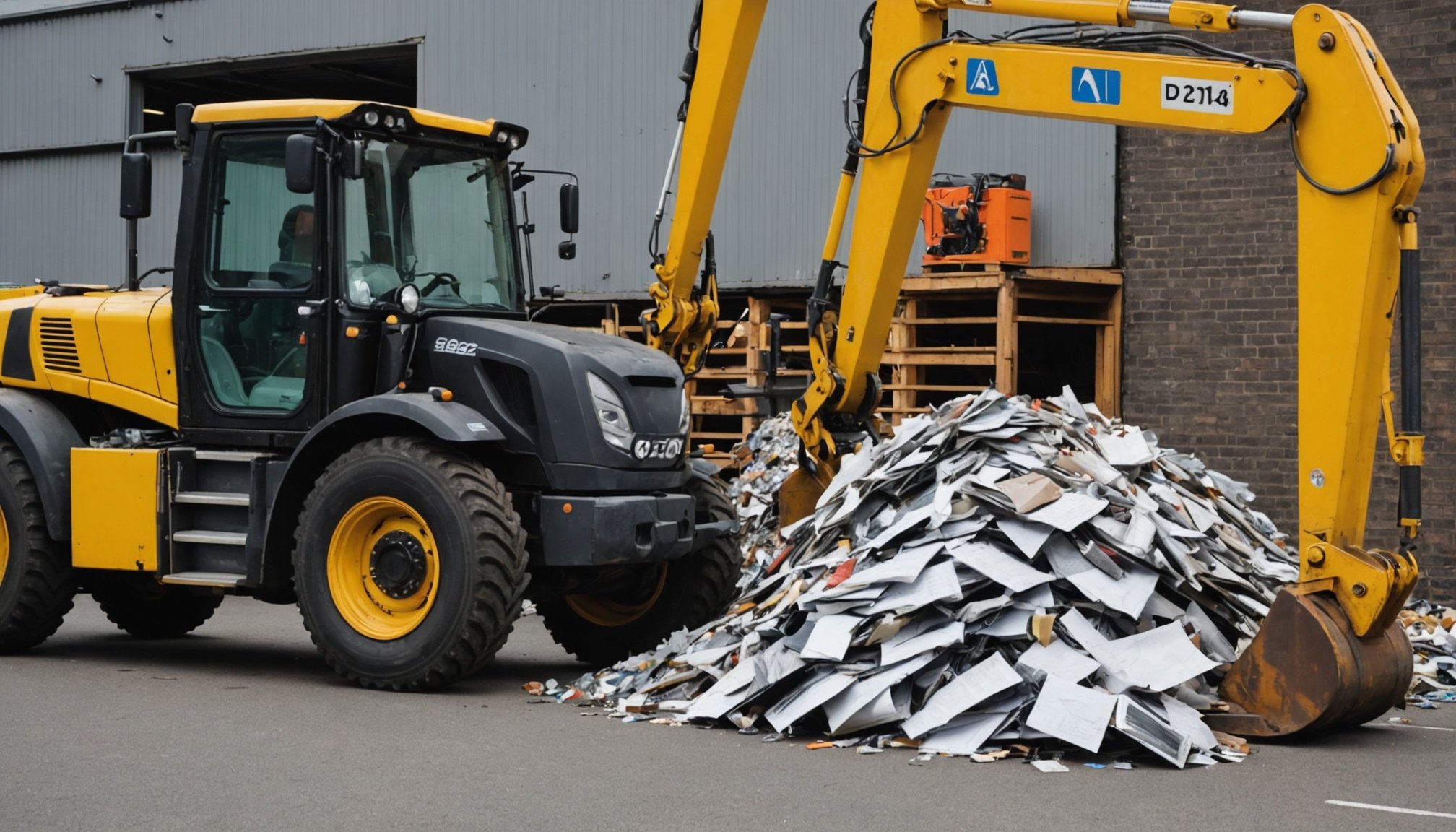Overview of the 2011 Waste Regulations
The 2011 Waste Regulations form a cornerstone of the UK legal framework for waste management, aiming to streamline environmental responsibility across industries. Introduced as part of a historical response to escalating environmental concerns, they establish the groundwork for modern waste management compliance.
Central to these regulations are key definitions that aid in understanding compliance mandates. The term “waste” broadly refers to any substance or object the holder discards or intends to discard. Moreover, waste management compliance involves ensuring waste is collected, transported, recovered, and disposed of responsibly, with minimal environmental impact.
Additional reading : Navigating Compliance: Essential Legal Strategies for UK Businesses Under the New Digital Services Act
These regulations have extensive applicability, covering a wide range of businesses in the UK. Whether large corporations or small enterprises, any business that produces, transports, or handles waste must understand and comply with these rules. UK legal framework under these regulations necessitates that businesses implement clear measures for waste prevention, preparation for reuse, recycling, and other forms of recovery.
Specific compliance obligations guide businesses in fulfilling their roles as responsible entities in waste management. Understanding these terms and adhering to guidelines are vital steps toward achieving compliance and fostering a sustainable future. The 2011 Waste Regulations not only address legal requirements but also encourage proactive environmental stewardship.
Also to read : Navigating Legal Challenges: Essential Strategies for UK Firms Utilizing AI in Credit Scoring
Overview of the 2011 Waste Regulations
The 2011 Waste Regulations were implemented to streamline waste management compliance within the UK, forming a key part of the UK Legal Framework. These regulations address the growing need to manage waste sustainably, expanding prior efforts to protect the environment while also reducing unnecessary costs for businesses. The primary aim is to ensure efficient and responsible disposal and treatment of waste by setting a clear legal structure that businesses must follow.
Central to these regulations are several essential definitions and terms relevant for compliance. “Waste” is broadly defined, encompassing any material that the holder discards or intends to discard. A firm understanding of these terms is critical for businesses seeking adherence to the regulations, as misinterpretation can lead to non-compliance.
The regulations apply to a wide range of UK businesses, covering various sectors engaged in the production, handling, and disposal of waste. For businesses, compliance means implementing systematic processes to ensure all generated waste is disposed of in accordance with legal standards. With these regulations, it’s crucial for businesses to continually align their procedures with the prescribed legal framework to avoid penalties and contribute to a sustainable environment. This encompasses familiarizing and adapting to the intricate requirements stated within the framework to ensure full compliance.
Essential Legal Responsibilities
Under the 2011 Waste Regulations, businesses shoulder significant legal obligations to ensure sustainable waste handling. These responsibilities vary based on business type, underscoring the necessity for customized strategies. For instance, producers are obligated to classify their waste correctly and provide proper documentation to waste collectors. Transporters, meanwhile, must ensure waste is securely transported to licensed facilities.
Documentation and meticulous record-keeping are paramount. Businesses must maintain comprehensive records of waste production, transport, and disposal. These documents serve as proof of compliance and facilitate audits by regulatory bodies.
For retailers handling hazardous waste, extra precautions are mandated to prevent environmental contamination. Large manufacturers might be tasked with recycling measures, whereas small enterprises could be involved in waste minimization activities. Consistent across all business types is the emphasis on adopting proactive waste management measures.
Failure to adhere to these business responsibilities may result in significant penalties, impacting not only the business’s financial standing but also its reputation. Engaging employees through training programs to understand these obligations enhances adherence and supports a culture of environmental responsibility. In essence, meeting these legal responsibilities is not only about compliance but also about contributing positively to environmental wellbeing.
Essential Legal Responsibilities
Navigating the legal obligations under the 2011 Waste Regulations requires businesses to carefully consider their waste handling practices. Each business must adhere to specific duties, tailored to their operations, ensuring waste is managed responsibly.
Businesses have a variety of responsibilities, including proper waste segregation and disposal, adhering to transportation regulations, and ensuring waste is handled by authorised entities. These mandates vary based on the sector and size of the business but are critical for achieving compliance.
For example, companies in manufacturing must focus on reducing by-products, while retail operations need precise waste categorisation. Additionally, service industries often require stringent documentation to track disposal procedures.
Documentation and record-keeping form an essential part of these obligations. Accurate records of waste management activities help verify compliance and can act as a defence during inspections. Businesses must often maintain detailed logs that include waste types, quantities, and disposal dates.
Understanding these responsibilities is not merely about avoiding penalties or legal consequences. It fosters proactive environmental stewardship, aligning business operations with sustainability goals. Implementing robust internal procedures ensures not only compliance but also enhances overall operational efficiency.
Compliance Management Strategies
Establishing effective Compliance Strategies is crucial for aligning with the 2011 Waste Regulations. A structured approach begins with developing a comprehensive waste management plan tailored to the unique operations of a business. This plan should encompass clear objectives for waste reduction, recycling, and disposal in compliance with regulatory standards.
Waste Management Techniques involve practical steps such as conducting regular waste audits to identify and address inefficiencies in waste handling processes. Implementing structured sorting systems can significantly enhance recycling rates and minimize landfill contributions. Utilising technology such as waste tracking software can optimise these processes, ensuring transparent and accountable waste flows.
Understanding the regulations allows businesses to adopt Best Practices that align with compliance expectations. Creating a culture of awareness is integral, achieved through regular training and awareness programs. These programs educate employees on the importance of correct waste segregation and disposal practices, fostering a shared commitment to compliance.
In summary, strategically integrating waste management activities into everyday business operations promotes sustainability and positions companies as responsible entities within the UK Legal Framework. Regular review of compliance measures and staying informed about regulatory changes further solidify successful compliance efforts.
Compliance Management Strategies
Creating effective compliance strategies is crucial for businesses under the 2011 Waste Regulations. It starts with a comprehensive waste management plan tailored to specific operational needs. This plan should consider the type of waste produced and the most viable waste management techniques applicable, ensuring alignment with legal standards. Developing clear processes helps streamline waste handling while minimising environmental impact.
Employees play a pivotal role in successful waste management. Therefore, implementing training and awareness programs is essential. These programs educate staff about compliance requirements and best practices in waste management techniques, fostering a culture of proactive environmental responsibility. Regular workshops and updated training materials keep everyone informed about changes in regulations and procedures facilitating continuous compliance.
Best practices involve regular audits and feedback loops to refine compliance strategies continually. Engaging with external experts can provide new insights and adaptations to evolving regulations. Additionally, technology can enhance these strategies, offering tools for tracking waste output, reporting compliance status, and managing records. Embracing such technology not only aids in maintaining compliance but also boosts operational efficiency, demonstrating a commitment to sustainable waste management practices.
Case Studies of Compliance
Understanding Real-World Examples of compliance with the 2011 Waste Regulations offers valuable insights into successful strategies and common pitfalls. For instance, a notable case in the manufacturing sector involved a company that significantly reduced waste production through improved material sourcing and efficient processes. This compliance success not only resulted in meeting regulatory standards but also led to cost savings and enhanced operational efficiency.
Conversely, lessons from non-compliance cases reveal critical oversights, such as inadequate documentation or improper waste segregation. For example, a retail business faced significant penalties due to the lack of proper waste records, highlighting the importance of meticulous waste management compliance practices.
These case studies elucidate valuable Best Practices that can be emulated by businesses across various sectors. Emphasising regular training for staff on waste handling requirements and maintaining precise records are proven to aid compliance efforts. Learning from these scenarios reinforces the value of integrating robust Compliance Strategies into daily business operations.
Ultimately, these examples underscore the broader applicability of compliance efforts, illustrating how adhering to the UK Legal Framework not only fulfills legal duties but also promotes environmental stewardship and business sustainability.
Case Studies of Compliance
Examining real-world examples of successful compliance can offer invaluable insights into effective compliance strategies. Across various industries, certain businesses have achieved notable success under the 2011 Waste Regulations through innovative approaches and rigorous adherence to guidelines.
In the manufacturing sector, case studies show success stories where companies have significantly reduced waste production by adopting strategic waste management techniques. For example, implementing closed-loop production systems allows for the recycling and reusing of by-products, resulting in both regulatory compliance and cost savings.
Conversely, lessons learned from non-compliance cases underscore the repercussions businesses face when failing to meet regulatory standards. Common issues include insufficient documentation and lack of employee training, which often lead to penalties and reputational damage.
These examples highlight best practices that can be drawn from case studies of compliance. Strategies such as regular training sessions, continuous monitoring, and the use of technology for waste tracking are frequently highlighted. Businesses that proactively integrate these elements into their operations not only comply more effectively but also enhance their environmental stewardship and operational efficiency. The shared experiences from these case studies provide a roadmap for other businesses aiming to achieve compliance success.
Checklists for Compliance
Ensuring alignment with the 2011 Waste Regulations requires businesses to utilise Compliance Checklists effectively. A thorough checklist aids in systematically monitoring waste management activities and ensures adherence to the UK Legal Framework.
A comprehensive compliance checklist typically includes:
- Waste Segregation: Ensures correct sorting of waste types.
- Documentation: Maintains records for audits and reporting.
- Facility Checks: Verifies that waste handling locations meet standards.
- Training Sessions: Confirms employee participation in educational programs.
Waste Management Tools such as audit templates and tracking software can further simplify compliance efforts. These tools help businesses identify areas needing improvement and streamline data collection process.
Regularly reviewing and updating Compliance Resources is also crucial. As regulations evolve, these resources need to reflect current standards. Businesses should schedule periodic evaluations of their checklists, ensuring they remain relevant and comprehensive.
By integrating these practices, businesses reinforce their commitment to meeting legal mandates and foster an environmentally responsible culture. Employing these tools not only helps achieve compliance but can also lead to efficient waste management and operation enhancements.
Checklists for Compliance
Adopting a structured approach through Compliance Checklists is invaluable for businesses facing the complexities of the 2011 Waste Regulations. These lists serve as a guiding framework ensuring that each step of the waste management process adheres to regulatory standards. Companies often devise checklists that correlate with the specific requirements of their operations, providing clarity for compliance responsibilities.
Waste Management Tools are essential adjuncts to these checklists, enhancing operational efficiency. Examples include software solutions that assist in tracking waste metrics and confirming regulatory adherence. These tools can automate record-keeping, reduce human error, and streamline reporting obligations, significantly aiding businesses in achieving compliance.
Regular review and updates of compliance checklists are crucial. Regulatory standards can evolve, and businesses must adapt their procedures accordingly. Staying proactive by frequently consulting updated compliance resources, such as industry publications or government notifications, is paramount.
Furthermore, companies can benefit from engaging in collaborative networks where experiences and resources are shared. By prioritising comprehensive and adaptable compliance protocols—through the use of checklists and tools—businesses position themselves as leaders in sustainable waste management. This proactive stance not only ensures adherence but also fosters a culture of environmental responsibility.
Potential Penalties for Violations
Upon non-compliance with the 2011 Waste Regulations, businesses may face severe legal penalties. These penalties are established to enforce adherence and ensure that businesses prioritise environmental responsibility. The consequences range from hefty fines to more stringent sanctions such as operational restrictions or even shutdowns for repeat offenders. The financial impact of these fines can significantly disrupt business operations and erode profit margins, underscoring the necessity of compliance.
Beyond financial repercussions, these penalties pose substantial threats to a company’s reputation. Negative publicity from enforcement actions can tarnish public perception and result in lost business opportunities. In today’s market, where consumers increasingly value corporate responsibility, maintaining a reputation for sustainable practices is pivotal.
Enforcement actions are carried out by regulatory bodies such as the Environment Agency, which holds the authority to inspect waste management practices, review documentation, and impose penalties. These bodies ensure that businesses comply with environmental legislation, maintaining ecological balance and public health. Understanding these aspects emphasises the importance of investing in sound waste management practices, training, and compliance monitoring mechanisms. It’s not merely about avoiding penalties but fostering a culture of sustainability and operational integrity.
Potential Penalties for Violations
Engaging with the 2011 Waste Regulations necessitates understanding potential legal penalties for non-compliant practices. Businesses that fail to meet compliance standards can encounter severe violation consequences, impacting both operational continuity and brand reputation. These penalties vary from financial fines to more severe enforcement measures, such as suspension of operations or legal action against business owners.
Financial penalties often constitute a significant impact, discouraging businesses from ignoring their business responsibilities. Moreover, non-compliance can damage a company’s public image, resulting in long-term reputational harm. This risk amplifies the necessity for businesses to rigorously adhere to their waste handling obligations.
Enforcement actions are frequently carried out by dedicated regulatory bodies such as the Environment Agency in England or the Scottish Environment Protection Agency, which are empowered to inspect, scrutinise, and hold accountable businesses that violate waste management laws. These regulatory bodies ensure that the UK Legal Framework remains robust and effective in promoting environmental protection.
Thus, businesses must remain vigilant in their compliance efforts to avoid these detrimental penalties and embrace responsible waste management, thereby safeguarding their own viability and contributing positively to environmental sustainability.
Updates on Legal Changes
In the ever-evolving landscape of waste management, staying informed about regulatory updates is crucial for compliance. Recent amendments to the 2011 Waste Regulations have focused on enhancing sustainability and broadening the scope of businesses, reinforcing the need for continuous compliance adaptation. For example, newer guidelines incentivize companies to reduce landfill dependency by promoting advanced recycling technologies.
Anticipated legal changes also suggest a shift towards stricter enforcement of waste management compliance. This might include heightened scrutiny on documentation and the introduction of more robust penalties for noncompliance. Businesses that proactively monitor these updates tend to maintain smoother operations by swiftly integrating new requirements into their waste management strategies.
Regular engagement with industry publications and updates from governmental agencies can assist companies in grasping the trajectory of these emerging changes. Furthermore, investing in periodic training ensures that all employees remain aware of the latest standards, which is key to seamless compliance adaptation. Being proactive allows businesses to not only adhere to the evolving UK Legal Framework but to also optimize their processes for long-term sustainability and operational efficiency.











